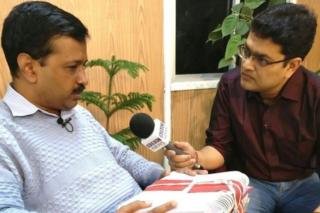VIDEO - Arvind Kejriwal: The fiery BBC interview that went viral in India - BBC News
 Image caption Mr Kejriwal did not take kindly to the questions of BBC reporter Nitin Srivastava
Image caption Mr Kejriwal did not take kindly to the questions of BBC reporter Nitin Srivastava A BBC Hindi Facebook Live interview with the chief minister of the Indian capital Delhi, Arvind Kejriwal, went viral after his angry responses to some of the reporter's questions about his stand on India's cash crisis. BBC Hindi's Nitin Srivastava describes what happened.
Mr Kejriwal, casually dressed in bathroom slippers and trousers, was a busy man that Friday evening, with back to back interviews planned at his official residence.
I was there with the BBC Hindi team for a scheduled Facebook Live session, then an interview, with Mr Kejriwal about his views on India's cash crisis.
The fiery chief minister has been one of the most vocal opponents of the government's shock decision to ban 500 and 1,000 rupee notes overnight. He is demanding that the move be entirely rolled back, citing the difficulties it is causing the common man.
The interview never took place. And that's because of what happened during the Facebook Live session.
Mr Kejriwal was combative right from the beginning, and grew increasingly agitated as the interview progressed.
He got particularly angry when I refused to let him use the live event as a platform to accuse several prominent businessmen of being corrupt with the blessings of the government.
What happened next was extraordinary.
Mr Kejriwal told me that the BBC and I were both "neech", which translates from the Hindi as "low class", adding that we were biased towards Prime Minister Narendra Modi's government. He refused to listen to my arguments.
The tipping point came, however, when he alleged that "55 people had died because of the cash crisis". I responded by asking him what proof he had to say this so conclusively.
A livid Mr Kejriwal now decided to address the audience himself. Looking straight into the camera, he said: "55 people have died over the issue and BBC says we can't link this to demonetisation. This is their honest journalism."
As the Facebook Live event ended, Mr Kejriwal stormed out of the room, refusing to participate in the sit-down interview we had agreed to. His parting words to me were: "This is not journalism and you have an agenda against me".
The live event was viewed more than 2.7 million times and was covered by all India's mainstream media organisations as it rapidly went viral in India.
Meanwhile the young and dynamic social media team that accompanies Mr Kejriwal everywhere he goes did not share the Facebook Live as promised earlier.
This is symptomatic of a worrying trend in India, where journalists are often accused of being "biased" towards one camp or another when they are only trying to do their job and ask valid and legitimate questions.
Such accusations are more worrying when it's not just supporters but politicians themselves who are making them.
The Facebook live in Hindi can be viewed here.